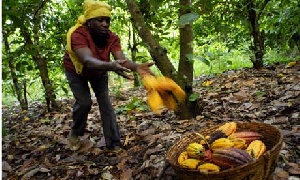Some cocoa farmers in the Eastern Region have appealed to the Ministry of Food and Agriculture (MoFA) to intervene and stop the Ghana Rubber Estate Limited (GREL) from illegally destroying their farms to cultivate rubber plantations.
According to them, the action of GREL could lead to a big drop in Ghana’s cocoa production.
The affected farmers claim that GREL started expanding rubber cultivation in the region some five years ago, and what is worrying is that some cocoa farmers have sold their farms to GREL, who have graded the land and planted rubber.
Some concerned citizens in the Suhum area of the Eastern Region have expressed worry that the area is gradually turning into a rubber plantation while cocoa farms vanish.
Currently, a family has lodged a complaint at the Asikesu Police Station that GREL has illegally destroyed part of their cocoa farms at Nyamebekyere, near Asikesu Odumase.
The case has been taken over by the Asamankese District Police Command.
Mr Timothy Martey Mensah, who is leading the aggrieved farmers, told The Finder that when the affected farmers confronted officials of GREL in the presence of the police, officials of GREL claimed to have purchased the land from some chiefs in the area.
Consequently, he said officials of GREL told the affected cocoa farmers to leave the land to them to cultivate rubber plantation.
According to Mr Mensah, in the presence of the police, officials of GREL had expressed their willingness to pay compensation and forcibly take over the lands, which the affected farmers rejected on grounds that the land rightfully belongs to them and therefore the said chiefs cannot claim ownership of their farmlands.
He stressed that the interest of the farmers was in cocoa production, to increase national cocoa output.
The aggrieved farmers want the police to process the case for court since GREL has trespassed on their property and has caused damage to their property.
When The Finder called the police investigator at Asikesu Police Station, she confirmed that such a case has been reported and the police are investigating.
GREL could not immediately be reached for comments.
Already, cocoa production is reducing in the Eastern Region because most cocoa lands have been destroyed by the activities of illegal mining.
The Eastern Region accounts for over 10% of Ghana’s total cocoa production.
The main occupations of the economically active population in the region are agriculture and related work.
Currently, 80% of cocoa farms affected by viruses are located in the Eastern Region and the western-north of the country.
GREL to build GH?33m factory
Last week, the management of GREL announced plans to commit GH?33 million to the building of a new factory to increase rubber production in the country.
The feasibility studies and consultation with all the stakeholders have also been completed to kick start the project.
Factory to be built in 2 phases over 10 years
The new factory is a huge investment the company is undertaking, and it would be done in two phases over 10 years, and would involve the construction of a new rubber processing plant at Apimanin.
First phase to be completed in 2019
The first phase of the project is expected to be completed in 2019, and by next month, recruitment for staff would begin.
GREL has a concession of 20,279 hectares in 4 regions.
GREL is the leading natural rubber producer in the country, and has a concession of 20,279 hectares, of which 15,041ha has been developed into rubber plantation in the Western, Central and Eastern regions.
ROPP cultivates 30,155 hectares of rubber
Rubber Out-growers Plantation Project (ROPP) has a total of 8,012 out-growers from 1995 to date, and have been assisted to plant 30,155 hectares of rubber.
Total funding of the project from 1995 to date stood at €59.5 million and that 3.700 out-grower farmers involving 15.004ha were under tapping.
Business News of Friday, 27 October 2017
Source: thefinderonline.com

















